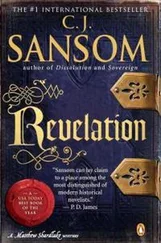‘I will, my Lord.’
‘The other aspect of the mission is to discover who stole the manuscript from here. It has to be someone with access to the Queen’s chamber. You will have to be sworn in as an assistant on the Queen’s Learned Council, as of this afternoon. You will be given a new robe with the Queen’s badge sewn into it; wear the robe when you are making enquiries within the palace. Wear your ordinary robe when you are looking into the Greening murder – there you should not be visibly connected to the Queen.’
‘Very well.’
Lord Parr nodded approvingly. Cranmer glanced at me, then quickly away; a look of pity, I thought, or perhaps doubt.
Lord Parr continued, ‘So far as investigations at the palace are concerned, you are known to have worked for the Queen on legal cases before. The story we will put around is that a valuable jewel, a ring bequeathed to her by her stepdaughter, has been stolen from the Queen’s coffer. Just to be sure, I have taken the ring and have it in safekeeping. It is worth a great deal. The Queen’s closeness to Margaret Neville, too, is well known; everyone will understand her eagerness that it be found. You will have authority to question servants in the Queen’s household about who might have gained access to that coffer. As it happens, some time ago a pageboy stole a jewel from one of the Queen’s ladies and after an investigation was caught. At the Queen’s insistence he was pardoned, because of his youth. People will remember that.’ He looked at me. ‘I would conduct the investigation myself, but for someone of my seniority to be seen taking this on personally would cause surprise. And in this place an outsider can often see things more clearly.’ He sighed. ‘The world of the court is an incestuous one. I am happier on my estates, I confess, but my duty lies here now.’
‘I am known as an enemy to certain on the King’s Council.’ I spoke hesitantly. ‘The Duke of Norfolk; above all, Richard Rich. And I once angered the King himself.’
Cranmer said, ‘Those are old matters, Matthew. And your investigations will be confined to the Queen’s household. If you uncover anything that seems to go wider, tell us and we will deal with it. I will not be returning to Canterbury until this is settled.’
‘Forgive me, my Lord Archbishop,’ I said, ‘but word may still get to Norfolk or Rich. You spoke of spies reporting what Gardiner said to you from the King’s Privy Chamber …’
‘Sympathizers,’ Cranmer replied reprovingly, ‘not spies.’
‘But may there not be those within the Queen’s household who sympathize with the opponents of reform? The very fact the manuscript was stolen suggests as much.’
‘That is the strange thing. We guard secrets very carefully in the Queen’s household.’ Cranmer looked at the Queen. ‘Her majesty inspires great loyalty, which was tested during the heresy hunt. We can identify no one who could, or would, have done this.’
There was a moment’s silence, then Lord Parr said, ‘Begin now, Serjeant Shardlake; try to unravel the threads. Go to the printer’s this afternoon. Come back this evening and I will swear you in, give you your robe and brief you further.’
I hesitated again. ‘I am to work entirely on my own?’
‘Young William Cecil may be useful, he has contacts among the radicals and is trusted by them. But he does not know of the Lamentation , and we will keep him out of it for now, I think.’ He continued, in a lighter tone, ‘Would you believe Cecil is already twice married, though only twenty-five? His first wife died in childbirth, and now he has a second. A woman with good connections. I think he will soon be a rising man.’
The Archbishop added, ‘And where the printer’s murder is concerned, you may employ your man Barak to help you. I understand he has been useful in the past.’
‘But –’ Lord Parr raised a warning finger ‘– he must know only that you are acting for the dead man’s parents; make no mention of the Queen or the Lamentation .’
I hesitated. ‘Barak is married now, with a child and another on the way. I would not put him in the way of even the possibility of danger. I have a student, Nicholas, but –’
Lord Parr interrupted. ‘I will leave that to your discretion. Perhaps he can be employed in routine matters. So long as you tell him nothing of the Lamentation .’ He looked at me intently again.
I nodded agreement, then turned to the Queen. She leaned forward and picked up the pearl on its chain round her neck. ‘Do you know to whom this once belonged?’ she asked quietly.
‘No, your majesty. It is very fine.’
‘Catherine Howard, who was Queen before me and who died on the block. A quicker death than burning.’ She gave a long, desperate sigh. ‘She, too, was foolish, though in a different way. All these rich things I wear, the cloth of gold and silken tissue and bright jewels, so many of them have been passed down from Queen to Queen. Always, you see, they are returned to the Department of the Queen’s Wardrobe, to be preserved or altered. They are worth so much that they cannot be discarded, any more than the great tapestries.’ She held up her richly embroidered sleeve. ‘This was once worn with a dress of Anne Boleyn’s. I have constant reminders of past events. I live in fear now, Matthew, great fear.’
‘I will do all I can, put all other work aside. I swear.’
She smiled. ‘Thank you. I knew you would succour me.’
Lord Parr inclined his head, indicating I should rise. I bowed to the Queen, who essayed another sad smile, and to Cranmer, who nodded. Lord Parr led me out, back to the window from which we had watched the King in the courtyard. The yard was empty now. I realized the window was in an angle of the corridor from which we could not be seen from either direction; ideal for private conversation. He said, ‘Thank you, sir. Believe me, we do not underestimate the difficulties, or the dangers. Come with me now and I will give you more particulars of Greening, and the power of attorney from his parents.’ He looked out over the courtyard, hesitated, then leaned closer. ‘You saw the physical state of the King. But as you will have realized from what we told you, his mind is still, mostly, sharp and clear. And it has always been full of anger and suspicion.’
IT WAS WITH A SENSE OF RELIEF that I rode out under the gate of the palace again. I made my way slowly towards Charing Cross. Genesis sneezed and shook his head at the dust from the Scotland Yard brickworks, which endlessly laboured to produce materials to embellish and improve Whitehall. The day was hot and the street stank. I decided I would take Nicholas with me to the printers’ quarter. It would do no harm to have someone young and sizeable beside me.
At the steps of the great Charing Cross, dozens of beggars sat as usual. More and more of them these last two years, with the polling and nipping of poor men’s wages caused by the collapsing value of the coinage. There were those who said that beggars were leeches, licking the sweat from hard-working labourers’ brows, but most of the beggars had once been working men themselves. I glanced at them, men and women and children, wearing ancient dirty rags, faces red and harsh from constant exposure to the sun, some displaying their sores and weeping scabs to invoke pity from the passers-by. One man who sat with the stump of one leg exposed wore the tatters of a soldier’s uniform; no doubt he had left his leg in Scotland or France during the last two years of war. But I averted my eyes, for it was well known that to catch the eye of one could bring a whole horde descending on you; and I had much to think on.
I was involved in a matter potentially more deadly than anything in my prior experience. It reached right into the heart of the royal court, at a time when the manoeuvring of various factions had never been more vicious. Recalling that spectacle of the King in the courtyard, I realized now that everything which had happened since the beginning of the year was part of a struggle to decide who would control the realm when Henry died and his throne passed to a child. In whose hands would the King leave the realm? Norfolk? Edward Seymour? Paget? The Queen?
Читать дальше
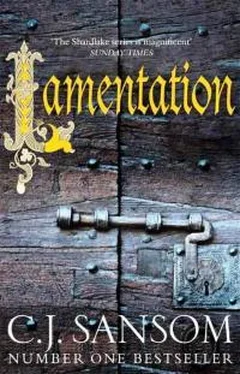
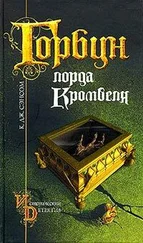
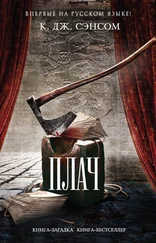




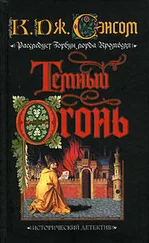
![К Сэнсом - Стенание [другой перевод]](/books/432043/k-sensom-stenanie-drugoj-perevod-thumb.webp)
